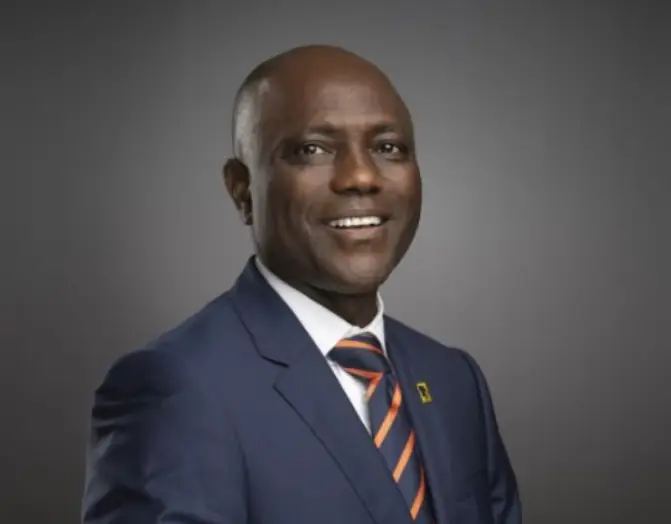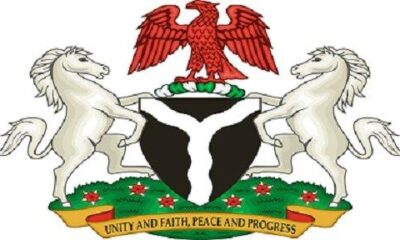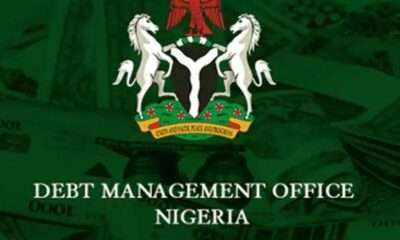Business
Nigeria’s Debt Jumps By 75% In Three Months, Hits N87tn
Published
8 months agoon
By
Editor
...How CBN loans to FG, new debts, promissory notes raise public debt by N37tn between April and June
The Debt Management Office has said Nigeria’s total public debt hit N87.38tn at the end of the second quarter of 2023.
The figure represents an increase of 75.29 per cent or N37.53tn compared to N49.85tn recorded at the end of March 2023.
The DMO in a report on Thursday said the debt includes the N22.71tn Ways and Means Advances of the Central Bank of Nigeria to the Federal Government.
The DMO stated, “Nigeria’s total public debt stock as at June 30, 2023, was N87.38tn ($113.42bn). It comprises the total domestic and external debts of the Federal Government of Nigeria, the thirty-six states, and the Federal Capital Territory.
“The major addition to the Public Debt Stock was the inclusion of the N22.712tn securitized FGN’s Ways and Means Advances.”
The statement also noted that other additions to the debt stock were new borrowings by the Federal Government and the sub-nationals from local and external sources.
It added, “The reforms already introduced by the present administration and those that may emerge from the recommendations of the Fiscal Reform and Tax Policies Committee, are expected to impact debt strategy and improve debt sustainability.”
The DMO had earlier projected that Nigeria’s public debt burden may hit N77tn following the National Assembly’s approval of the request by former President Muhammadu Buhari to restructure the CBN’s Ways and Means Advances.
The Ways and Means Advances is a loan facility through which the CBN finances the shortfalls in the government’s budget.
The Director-General of the DMO, Patience Oniha, during a public presentation of the 2023 budget organised by the former Minister of Finance, Budget and National Planning, Dr Zainab Ahmed, noted that the debt would be N70tn without N5tn new borrowing and N2tn promissory notes.
READ ALSO: Buhari Was Servicing Debt With 96% Nation’s Income – Oshiomhole
However, the latest data showed that the current debt stock of N87.38tn exceeded the DMO’s projection by N10.38tn.
Further breakdown showed that Nigeria has a total domestic debt of N54.13tn and total external debt of N33.25tn.
While the domestic debt makes up 61.95 per cent of total debt, the external makes up 38.05 per cent.
According to The PUNCH, there was also a significant increase in both domestic and external debt within three months.
The domestic debt rose by 79.18 per cent from N30.21tn while the external debt rose by 69.28 per cent from N19.64tn in Q1 2023.
In its 2022 Debt Sustainability Analysis Report, the DMO warned that the Federal Government’s projected revenue of N10tn for 2023 could not support fresh borrowings.
According to the office, the projected government’s debt service-to-revenue ratio of 73.5 per cent for 2023 is high and a threat to debt sustainability.
It noted that the government’s current revenue profile could not support higher levels of borrowing.
In a report titled, ‘Report of the Annual National Market Access Country Debt Sustainability Analysis (DSA),’ the debt office said, “The projected FGN Debt Service-to-Revenue ratio at 73.5 per cent for 2023 is high and a threat to debt sustainability.
READ ALSO: N10.4 Billion Judgement debt: Senate indicts Malami-led Justice Ministry
“It means that the revenue profile cannot support higher levels of borrowing. Attaining a sustainable FGN Debt Service-to-Revenue ratio would require an increase of FGN Revenue from N10.49tn projected in the 2023 Budget to about N15.5tn.”
DMO stated that the government must pay attention to revenue generation by implementing far-reaching revenue mobilisation initiatives and reforms including the Strategic Revenue Growth Initiatives and all its pillars with a view to raising the country’s tax revenue to GDP ratio from about 7 per cent to that of its peer.
The Federal Government would be unable to borrow a lot as it nears its self-imposed debt limit of 40 per cent, the DMO said.
To reduce borrowing and budget deficit, DMO stated that the government should encourage the private sector to fund some of the capital projects that were being financed from borrowing through the public-private partnership schemes.
It added that the Federal Government can reduce borrowing through the privatisation and/or sale of Government assets.
Over the years, Nigeria’s low revenue generation has pushed the government to more borrowing.
However, President Bola Tinubu recently expressed his administration’s commitment to break the cycle of overreliance on borrowing for public spending, and the resultant burden of debt servicing it places on management of limited government revenues.
Inaugurating the Presidential Committee on Fiscal Policy and Tax Reforms, chaired by Taiwo Oyedele, the President charged the committee to improve the country’s revenue profile and business environment.
READ ALSO: Why Nigeria’s Debt Is Rising – Debt Management Office
Ways and Means
According to a Monetary Policy Committee member, Adeola Adenikinju, regarding the fiscal sector, both the government revenue and expenditure underperformed between January and May 2023.
In his personal statement released by the Central Bank at the last MPC meeting, he said the FG retained revenue stood at N1.67tn, lower than the pro-rata target of N1.97tn, which was due to the underperformance of FAAC receipts, gross independent revenue.
He said, “In the same vein, total FGN expenditure as of May 2023, was N4.77tn, 27.8 per cent lower than the budget estimate of N6.61tn. The shortfall came mainly from allocation for debt service, interest on Ways and Means, and capital expenditure.”
However, he added that the rise in FAAC overtime would help in managing the recourse of the FG and sub-national units on debts to finance government activities.
“This would also reduce Ways and Means finance and eventually reduce inflationary pressures from the monetary side,” he said.
Naira devaluation
The Deputy-President of the Lagos Chamber of Commerce and Industry, Gabriel Idahosa, blamed the devaluation of the naira as a major factor that increased the public debt, in naira terms.
He further stated that the new administration might have also inherited undisclosed debts which have accumulated to raise the figure to N87tn by the second quarter of the year.
READ ALSO: DMO Defends $13bn Indebtedness To World Bank
He said, “The foreign exchange conversion will easily move the debt from N37tn to about N64tn. So, before the convergence, the rate was about N460. Now the CBN rate is about N800. So, that is almost double. So, it is not really mysterious.
“The only thing is that there is still a gap, it shouldn’t be up to N87tn unless additional debt was taken. It could be that some debts were not captured until now that the new government is opening the all the books.”
Similarly, a professor of Economics at the Olabisi Onabanjo University, Sheriffdeen Tella, cited the floating of the naira as the major factor that has caused the significant increase in Nigeria’s total debt.
Tella said, “You see, the naira depreciated seriously in the second quarter. So, that depreciation would have been used to calculate the debt. The domestic borrowing also increased because of the borrowing from the central bank to pay up debts on subsidy.
“The government was borrowing to pay for subsidy and that subsidy was steadily increasing. If you convert it to dollars, it won’t be so much, but because naira has depreciated, by the time you do the multiplication, it will increase significantly in naira terms.”
Revenue challenges
An economic expert and a former Assistant Head of Research at the CBN, Prof. Jonathan Aremu, said there was nothing wrong with debt but stressed the need to examine the reasons the debts were being incurred.
He said, “Like I used to say, there is nothing wrong in borrowing. Borrowing is divided into two, when you borrow to finance the budget that is productive and boosts economic growth, that is good. If it is borrowing to finance infrastructure, then we have productivity in the economy. But when you borrow for dead weights, i.e., to say it doesn’t have productive uses, that is where the question arises. Any borrowing that is meant for domestic consumption, not investment is a tax on the incoming generation and is not a sustainable borrowing.”
He noted that the country appears to be borrowing for the present population to be able to feed themselves, leaving the repayment to future generations.
READ ALSO: Nigeria’s Total Debt Hits N44.06tr
Aremu highlighted, “The money borrowed by the government from the CBN must be paid back within a year, that is why they call it Ways and Means. It is the way and means in which the government can use to augment its expense. It shouldn’t be the primary thing that you use to surcharge the future generation.”
He further stated that the country’s high debt would affect whatever gains from subsidy. Aremu added, “The money we are paying in terms of capital and obviously the repayment of interests will affect whatever gain we are gaining from other sectors.”
Speaking further, MPC member, Adenikinju, noted that while debt is an issue, work needs to be done in raising the country’s revenue.
He said, “This shows that we need to address our revenue challenges. Debt is an issue if you do not have adequate revenue. Therefore it is important that the government sees how it can work on revenue to service this debt and at the same time lay sustainable economic growth for this country.”
He stated that with some of the recent measures of the government, such as fuel subsidy removal, addressing the exchange rate issue and setting up a tax reform committee, would help the country grow its revenue base.
Adenikinju further advised, “In addition to raising revenue, we need to make sure that we do not incur more debt to the one that we have, except we have an assurance that the debt will lead to economic growth and generate revenue.
“The issue of cost of governance has been raised and these are things that the government has to look into. It needs to be addressed. The good thing about our debt is that most of them are owed to multi-lateral bodies and the repayments are spread over a long period of time. Also, the CBN debt has been securitised allowing repayment to be over a period of time too. So, yes, we have debt, but the structure of the debt will not necessarily constitute an issue.”
He added that the country would have been in more problem if the bulk of its debt were commercial.
PUNCH
You may like


Hajj: Five States With $383m Debt Budget N9bn For Pilgrims


DMO Opens FG Savings Bond Subscription At 18.06%


Full List: 13 New Governors Borrowed N226.8bn In Six Months – DMO


Nigeria’s Debt Hit N97.34tn In Q4 2023 – DMO


DMO Lists N350bn Sukuk Bond On NGX, FMDQ


DMO Lists Two FG Savings Bonds For Subscription

The Central Bank of Nigeria (CBN) started fresh and direct sales of US dollars at N1,021 per dollar to Bureau De Change operators.
Nigeria’s apex bank disclosed this in a circular signed by its Director of Trade and Exchange Department Hassan Mahmud.
“We write to inform you of the sale of $10,000 by the Central Bank of Nigeria (CBN) to BDCs at the rate of N1,021/$1. The BDCs are in turn to sell to eligible end users at a spread of NOT MORE THAN 1.5 percent above the purchase price,” the circular posted on its website read.
READ ALSO: Tinubu Unveils African Counter-Terrorism Summit
“ALL eligible BDCs are therefore directed to commence payment of the Naira deposit to the underlisted CBN Naira Deposit Account Numbers from today, Monday, April 22, 2024, and submit confirmation of payment, with other necessary documentations, for disbursement of FX at the respective CBN Branches.”
CBN’s move is coming as the naira is recording a slight depreciation against the dollar after weeks of gains.
In late March, the bank also sold $10,000 to each of the eligible Bureau De Change (BDC) operators in the country at the rate of N1,251/$1.
READ ALSO: Mixed Reactions Trail Video Of Couple’s Customised N200 Notes
Like in the most recent sales, it warned BDCs against breaching terms of the dollar sales, vowing to sanction defaulters “including outright suspension from further participation in the sale”.
The fortunes of the naira have fallen sharply since President Bola Tinubu took over in May. Inflation figures have reached new highs and the cost of living hitting the rooftops.
Nigeria’s currency slid to about N1,900/$ some months ago at the parallel market. But in recent weeks, it has gained against the dollar.
The Nigerian authorities have also doubled down on their crackdown against cryptocurrency platform Binance and illegal BDCs.
On March 1, the CBN revoked the licences of 4,173 BDCs over compliance failures.

Olusegun Alebiosu has been appointed as the Acting Managing Director/Chief Executive Officer of First Bank of Nigeria Limited (FirstBank Group), effective April 2024.
Alebiosu steps into this pivotal role from his previous position as the Executive Director, Chief Risk Officer, and Executive Compliance Officer, a position he held since January 2022.
Alebiosu brings to the helm of FirstBank over 28 years of extensive experience in the banking and financial services industry. His expertise spans various domains including credit risk management, financial planning and control, corporate and commercial banking, agriculture financing, oil and gas, transportation, and project financing.
READ ALSO: JUST IN: Access Holdings Names New Acting CEO
Having embarked on his professional journey in 1991 with Oceanic Bank Plc. (now EcoBank Plc.), Alebiosu has held several notable positions in esteemed financial institutions.
Prior to joining FirstBank in 2016, he served as Chief Risk Officer at Coronation Merchant Bank Limited, Chief Credit Risk Officer at the African Development Bank Group, and Group Head of Credit Policy & Deputy Chief Credit Risk Officer at United Bank for Africa Plc.
Alebiosu’s academic credentials further enrich his professional profile. He is an alumnus of the Harvard School of Government and holds a Bachelor’s degree in Industrial Relations and Personnel Management. Additionally, he obtained a Master’s degree in International Law and Diplomacy from the University of Lagos, as well as a Master’s degree in Development Studies from the London School of Economics and Political Science.
READ ALSO: Meet Newly Appointed Union Bank CEO
A distinguished member of various professional bodies, including the Institute of Chartered Accountants (FCA), Nigeria Institute of Management (ANIM), and Chartered Institute of Bankers of Nigeria (CIBN), Alebiosu is renowned for his commitment to excellence and ethical practices in the banking sector.
Beyond his professional endeavors, Alebiosu is known for his passion for golf and adventure. He is happily married and a proud parent.
With Alebiosu’s appointment, FirstBank of Nigeria Limited anticipates continued growth and innovation under his leadership, reinforcing its position as a leading financial institution in Nigeria and beyond.
Business
CBN Gives New Directive On Lending In Real Estate
Published
2 weeks agoon
April 17, 2024By
Editor
The Central Bank of Nigeria, CBN, has released a new regulatory directive to enhance lending to the real sector of the Nigerian economy.
The directive, issued on April 17, 2024, with reference number BSD/DIR/PUB/LAB/017/005 and signed by the Acting Director of Banking Supervision, Adetona Adedeji, signifies a notable shift in the bank’s policy towards a more contractionary approach.
In line with the new measures, the CBN has reduced the loan-to-deposit ratio by 15 percentage points, down to 50 per cent.
This move aligns with the CBN’s current monetary tightening policies and reflects the increase in the Cash Reserve ratio rate for banks.
READ ALSO: JUST IN: CBN Gov Sacks Eight Directors, 32 Others
The LDR is a metric used to evaluate a bank’s liquidity by comparing its total loans to its total deposits over the same period, expressed as a percentage.
An excessively high ratio may indicate insufficient liquidity to meet unexpected fund requirements.
All Deposit Money Banks are now mandated to adhere to this revised LDR.
The CBN has stated that average daily figures will be utilised to gauge compliance with this directive.
Furthermore, while DMBs are encouraged to maintain robust risk management practices in their lending activities, the CBN has committed to continuous monitoring of adherence and will adjust the LDR as necessary based on market developments.
READ ALSO: JUST IN: CBN Increases Interest Rate To 24.75%
Adedeji has called on all banks to acknowledge these modifications and adjust their operations accordingly. He emphasised that this regulatory adjustment is anticipated to significantly influence the banking sector and the wider Nigerian economy.
The circular read in part, “Following a shift in the Bank’s policy stance towards a more contractionary approach, it is crucial to revise the loan-to-deposit ratio policy to conform with the CBN’s ongoing monetary tightening.
“Consequently, the CBN has decided to decrease the LDR by 15 percentage points to 50 per cent, proportionate to the rise in the CRR rate for banks.
“All DMBs must maintain this level, and it is advised that average daily figures will still be applied for compliance assessment.
“While DMBs are urged to sustain strong risk management practices concerning their lending operations, the CBN will persist in monitoring compliance, reviewing market developments, and making necessary adjustments to the LDR. Please be guided accordingly.”

You’re Wicked Soul – Actress Okorie Slams Zubby Michael For Mourning Junior Pope On Instagram

How God Saved Me From Firing Squad – Gospel Artiste, Buchi

400 Bodies Found In Mass Grave In Gaza Hospital
Trending

 News4 days ago
News4 days agoDrama! Supporters Of Yahaya Bello Perform Rituals to Prevent His Arrest By EFCC [Video]

 Headline5 days ago
Headline5 days agoDrama As Women Fight Dirty, Breasts Fall Out During Spring Break Outing In US [PHOTOS/VIDEO]

 Entertainment4 days ago
Entertainment4 days agoNollywood Actor, Zulu Adigwe Is Dead

 News4 days ago
News4 days agoVIDEO: Force PRO Orders Arrest Officers Caught On Video Bashing Driver’s Car

 Headline4 days ago
Headline4 days agoMeet 17-year-old Nigerian Who Won $3.5m Worth Of Scholarships From Harvard, 13 Other Foreign Universities

 Metro4 days ago
Metro4 days agoEdo Cultists Kill Rival In Daughter’s Presence, Abandon Getaway Car

 Headline5 days ago
Headline5 days agoVideo Of Girl Being Bullied, Slapped At Lead British School Sparks Outrage Online [PHOTOS/VIDEO]

 Headline3 days ago
Headline3 days agoVIDEO: Meet Nigerian Pastor Who Predicted World Will End April 25

 News5 days ago
News5 days agoBREAKING: Dangote Further Crashes Diesel, Aviation Fuel Price

 News3 days ago
News3 days agoEdo: FRSC Threatens Sanction On Truck Drivers Loading Goods, Passengers Together




























